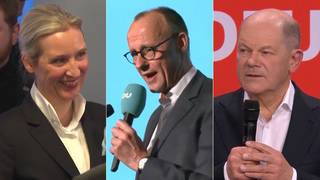
Topics
By Amy Goodman with Denis Moynihan
VISBY, Sweden—Sixty miles off the coast of Sweden, in the Baltic Sea, sits the island of Gotland. Every summer, for one week, tens of thousands flock here to participate in a unique public event known as Almedalen (pronounced ALL-meh-DAH-len). The name comes from a park in Gotland’s main town of Visby, where, in 1968, Sweden’s education minister at the time, Olof Palme, stood on the back of a flatbed truck and gave one of the rousing political speeches for which he was renowned. Palme went on to become one of Sweden’s most transformative prime ministers, up until his assassination on the streets of Stockholm in 1986. The speech that Palme gave in Visby planted the seed for what has grown into Almedalen, a vibrant, open, festive and freewheeling week of debate and dialogue, demonstration and dissent. A dose of this would no doubt benefit the ailing, gridlocked body politic in the United States.
As a parliamentary democracy, the Swedish government is formed by coalition. Smaller parties have a role here, thanks to the proportional representation voting system, which ensures that any party that gains at least 4 percent of the vote nationally will be represented in parliament. The parties that can create a coalition with more than 50 percent of the members of parliament will then run the government, deciding amongst themselves who gets chosen as prime minister, foreign minister and so on. It is a system of governance that rewards participants for finding common ground. Contrast this with the U.S. government, chosen in “winner take all” elections that marginalize small parties and shore up our dysfunctional, polarized two-party system.
Here in Almedalen, all the major political parties in Sweden come and showcase their ideas, with each party featured on one day of the week. On the morning we arrived on Gotland, the Green Party was featured, with environmental issues at the fore. A crowd gathered around a fair-trade coffee stall, where Per Bolund, Green Party member of parliament, was questioning corporate CEOs about environmental regulations they would like to see. And they were actually responding! Sound pie in the sky?
While Swedish Prime Minister Fredrik Reinfeldt of the center-right Alliance coalition led a parade nearby, followed by 50 chanting college-age supporters in matching orange T-shirts, current polling suggests that come September’s elections, they will lose to the Red-Green coalition, which includes the Social Democrats, the Greens, the Left Party and the new Feminist Initiative party. The Feminist Initiative has enjoyed recent success at the polls and is expected to send the first radical feminist to a national parliament.
Many at Almedalen are exerting pressure from outside of the political parties. I spoke with the first-ever female archbishop of the Church of Sweden, Antje Jackelen. I asked her how long it took for a woman to get that job: She smiled, “850 years.” She is now leading her church in a major fight to curb climate change. Among her strategies: “cutting the emissions, of course, and divestment from the fossil fuel industry.” But it is not just a matter of the economy, science or technology. It goes to the question, she said, of “what is the role of the human being in the world? So it’s utterly an existential and religious question, and we should address it as people of faith.”
As one of the large Gotland ferries arrived from the mainland, a group of antiwar protesters dressed as a Swedish-made weapon greeted the new arrivals. The protesters, organized by Amnesty International, were highlighting the role of arms exports in the Swedish economy. Although Sweden is the birthplace of Alfred Nobel, the founder of the Nobel Peace Prize, Sweden is one of the top arms-exporting nations on the planet.
Another participant at Almedalen this week is Martin Smedjeback. He has been sent to prison on three separate occasions for entering arms plants and hammering on weapons bound for export. “It’s actually a strong majority of people who want to stop the weapons export,” he told me. He said Saab, the car manufacturer, actually accounts for 50 percent of Swedish arms sales. As people spilled off the ferry, I asked Smedjeback how long he was willing to protest: “I’ll happily stop if they stop selling weapons to people and using them in wars … That’s what I’m doing here in Almedalen.”
Democracy demands a vigorous debate, an informed and engaged populace and a diversity of parties and positions. As we in the United States celebrate this nation’s independence, let’s question the strength and vitality of our system, and what we could learn from the late Olof Palme and a week like Almedalen.
Amy Goodman is the host of “Democracy Now!,” a daily international TV/radio news hour airing on more than 1,200 stations in North America. She is the co-author of “The Silenced Majority,” a New York Times best-seller.
© 2014 Amy Goodman
Distributed by King Features Syndicate











Media Options